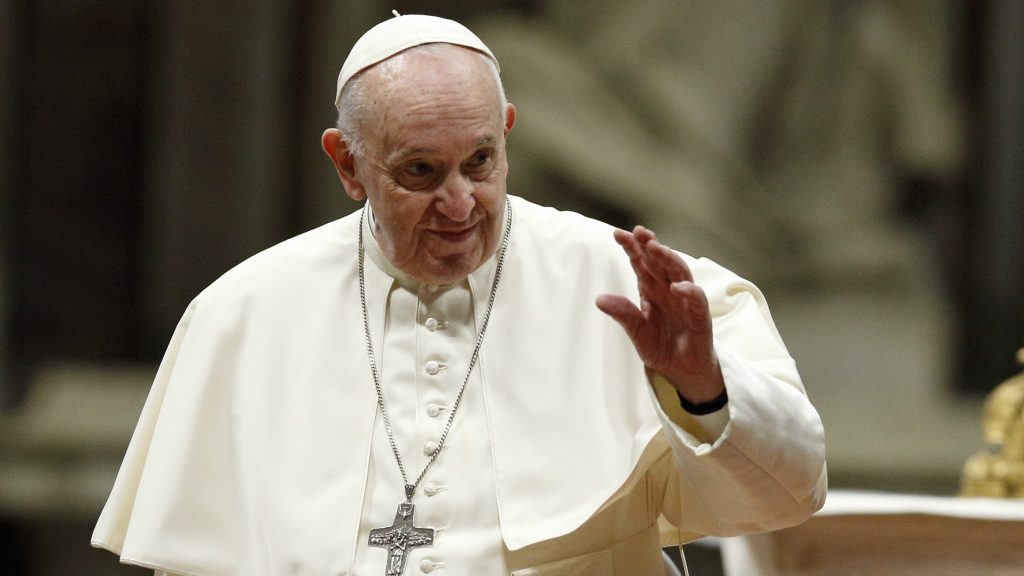St. Joseph continues to protect the Catholic Church today, just like he protected the Virgin Mary and Child Jesus, Pope Francis said at his general audience on Wednesday.
“In the Gospel of Luke, Joseph appears as the guardian of Jesus and of Mary. And for this reason, he is also ‘the Guardian of the Church,’” the pope said Nov. 24 at the live-streamed gathering in the Vatican’s Paul VI Hall.
Quoting Patris corde, his 2020 apostolic letter on St. Joseph, he added: “If [Joseph] was the custodian of Jesus and Mary, now that he is in heaven, he works and continues to be the custodian, in this case, of the Church; ‘For the Church is the continuation of the Body of Christ in history, even as Mary’s motherhood is reflected in the motherhood of the Church. In his continued protection of the Church’ — please do not forget this: today Joseph protects the Church — ‘he continues to protect the child and his mother.’”
This was Pope Francis’ second week in a catechetical series on St. Joseph. He said that “although apparently marginal, discreet, and in the background,” the saint “is in fact a central element in the history of salvation.”
The pope’s message focused on the genealogy of Jesus as recounted in the Gospels of Matthew and Luke, and what this can teach us about St. Joseph.
“Both Evangelists present Joseph not as the biological father, but, however, as fully the father of Jesus,” he said. “Through him, Jesus fulfills the history of the covenant and salvation between God and man.”
As seen in St. Luke’s genealogy, Joseph is a link between Adam, the first man, and Jesus, the pope said, showing Christians the importance of their own roots.
Referencing the Polish philosopher and sociologist Zygmunt Bauman, Francis explained that a “liquid” society has no consistency.
“I will correct that philosopher who coined this definition and say, more than liquid — gaseous, a properly gaseous society,” he added. “This liquid, gaseous society finds in the story of Joseph a clear indication of the importance of human bonds.”
“Indeed, the Gospel tells us the genealogy of Jesus not only for a theological reason, but also to remind each one of us that our lives are made up of bonds that precede and accompany us,” he said. “The Son of God chose to come into the world by way of such bonds.”
Pope Francis noted that for those who struggle to find meaningful human bonds in their life, who feel alone, or lack strength or courage, St. Joseph is “an ally, a friend, and a support.”
He concluded his audience with a prayer to St. Joseph to help anyone who is feeling this way:
“St. Joseph,
you who guarded the bond with Mary and Jesus,
help us to care for the relationships in our lives.
May no one experience the sense of abandonment
that comes from loneliness.
Let each of us be reconciled with our own history,
with those who have gone before,
and recognize even in the mistakes committed
a way through which Providence has made a path,
and evil did not have the last word.
Show yourself to be a friend to those who struggle the most,
and as you supported Mary and Jesus in difficult times,
support us too on our journey. Amen.”
During the pope’s greetings at the end of the catechesis, a group of pilgrims from the United States sang the Apostles’ Creed while holding a banner with the words “You are Peter and on this rock I will build my Church.” The background of the banner depicted the U.S. flag, a metal fence, and an icon of the Virgin Mary.
A group from Neocatechumenal communities in the Archdiocese of Newark, New Jersey, had sung the Apostles’ Creed at the pope’s Nov. 10 audience. They held a banner that read: “Peter confirm our faith.”
As not everyone who wished to attend the audience could fit inside the Paul VI Hall on Nov. 24, Pope Francis went first to St. Peter’s Basilica to greet three large pilgrim groups: The John Paul II Association of Bisceglie, southern Italy; members of the Vincentian Family; and the Italian Association of Victims of Violence.
He thanked the association helping victims of violence for their support for the mistreated. “With your important activity, you contribute to building a more just and solidary society,” he said.
The pope encouraged the John Paul II group to imitate the example of the Polish pope, “and strive to understand and welcome the love of God, source and reason for our true joy.”
He thanked the Italian pilgrims from the Vincentian Family for bringing hope and God’s mercy to many people during the pandemic.
“You have given testimony to the way of the ‘Church which goes out,’ which reaches everyone, starting from the excluded and marginalized,” he said. “Continue on this road and open yourselves always more to the action of the Holy Spirit, who instills the strength to boldly announce the newness of the Gospel.”
After stopping briefly to pray in front of a statue of Our Lady of the Miraculous Medal, Pope Francis took time to personally greet people in the crowd before moving to the Paul VI Hall.

